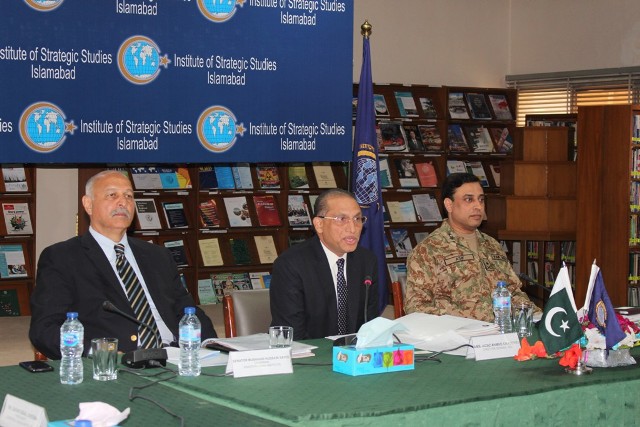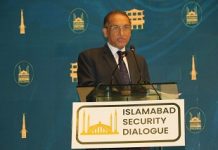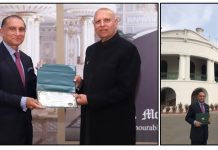Roundtable with Secretary General ECO
on
Role of ECO in Regional Integration
14 March 2019
Excellencies, Distinguished Panellists, Ladies and Gentlemen,
It gives me great pleasure to welcome you all to the Institute of Strategic Studies. We have amongst us today, an eminent executive head of Economic Cooperation Organization (ECO), H.E. Dr. Hadi Suleimanpour. The Secretary General is an experienced hand, and brings to the Organization not only academic rigor but also an illustrious career in the government of Islamic Republic of Iran. Dr Suleimanpour will share with us his vision of what ECO can do to promote regional economic cooperation.
Ladies and Gentlemen,
We are living today in an inter-connected world. During the past two decades, globalization became a buzz word in the discourse of world politics. However, just like any other socio-political phenomenon, globalization is spurring many reactions and responses. Regionalization is one of them. Connecting regional countries, promoting intra-regional cooperation and regional economic integration are some of its notable characteristics. To lead the process of regional cooperation and integration, regional organizations play a central role – the role of a catalyst and that of a locomotive.
Here, in our region, Central and West Asia, ECO holds the promise of leading regional economic integration. ECO started off well, with a rich inheritance from its predecessor Organization called Regional Cooperation and Development (RCD). When I was growing up as a young kid during the sixties, RCD was a household name. Inclusion of Central Asian states after the dissolution of Soviet Union was a natural evolution of RCD to ECO. It has been a personal privilege to have remained associated with this transition in 1992. I remember travelling through the region accompanying the then Secretary General Shamshad Ahmad to pave a strong foundation for the new expanded organization. The nineties was a period of great hope and expectation for regional integration. I spent good five years in ECO Secretariat and saw the Organization take roots.
Mr. Secretary General,
Let me make three points for your reflection.
It has now been several decades that our region has been attempting integration. While Pakistan takes pride in being part of this process as a founding state of ECO, it shares the sentiment expressed widely that we must take an honest stock of what we have achieved in tangible terms and what we have not.
My second point is that we all know well that the potential for regional cooperation in our region is enormous. Take for instance just one aspect. More than half of the ten members of ECO are land-locked. Linking them all is not only an imperative for the ECO members, it unleashes huge possibilities for regional economic cooperation.
For any regional integration, trade, infrastructure and energy act as the three mutually reinforcing pillars. ECO can serve as an effective platform for the member countries to actualize their individual and collective potential in the three domains. All ECO member states are well-endowed with natural and human resources: Azerbaijan, Kazakhstan, Turkmenistan, Uzbekistan, Iran and Turkey are rich in energy resources; Tajikistan and Kyrgyzstan have enormous potential for hydel energy. Pakistan stands at the crossroads of regional connectivity and, by utilizing its Gwadar port, it can provide access to the land-locked Central Asian states.
Then why is it that this huge potential has not been exploited fully. While a lot has been accomplished in terms of planning and legislating documentation, it appears that implementation and political will have not been commensurate with the promise. We would certainly like to hear more on this from the Secretary General.
Ladies and Gentlemen,
Thirdly, a critical feature of the contemporary era is the politics of trans-national corridors. Within the ECO region, several trans-national connectivity initiatives are unfolding: International North-South Transport Corridor (INSTC), China-Pakistan Economic Corridor (CPEC), and Trans-Caspian International Transportation Route (TCITR), to mention a few. While these initiatives will enhance and improve land connectivity among the member states, Gwadar and Chahbhar ports can facilitate the maritime trade. Given the geographical proximity and economic cooperation of the member states with China, the aforementioned and other trans-national corridors can complement and supplement the Belt and Road Initiative (BRI). Linking up to BRI that connects the Eurasian landmass can add substance to the economic initiatives under the framework of ECO. This in turn will facilitate the economic integration of the ECO region to the broader canvas of globalization. We would like to hear from the Secretary General how this perspective has been viewed in the ECO Secretariat.
Ladies and Gentlemen,
ECO Vision 2025 has set the targets for the member states to collaborate in the field of economic cooperation and cope with the challenges unfolding in the changing global landscape. We understand that to accomplish this vision, mustering political will is the primary pre-requisite. The indisputable reality is that the potential of the ECO cannot be fully realized until the member states proactively work together in the domains of sustainable economic development, cooperation and integration. We are happy to see the Secretary General reaching out to the member states to mobilize that political will which can spur the programs of ECO to make our region prosperous and developed.
With these welcome remarks, may I now invite Dr Suleimanpour, the honourable Secretary General of ECO to kindly share his thoughts with us.












